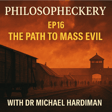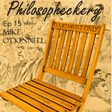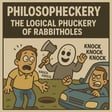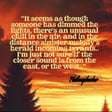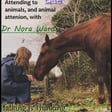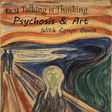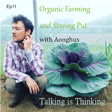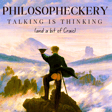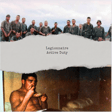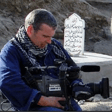Become a Creator today!Start creating today - Share your story with the world!
Start for free
00:00:00
00:00:01

Ep 05- Mythology, farming, and democracy with Prof John Pauley
In 2024, we ask is a pristine field nowadays, a sign of a diligent hard-working family farmer?
Or, is it a sign of something more destructive and less noble?
It is my pleasure to share some insights from the wonderful John Pauley, Director of Interdisciplinary studies at Simpson University, Iowa and Professor of philosophy.
Transcript
Introduction and Welcoming the Guest
00:00:01
philosophecker
um Hello everybody and welcome to Philosophagory. We have a very interesting and special guest here on the podcast today, all the way from, I think he's in Maine at the moment, but normally in Iowa.
00:00:17
john pauley
But.
00:00:19
philosophecker
He's a professor of philosophy at Simpson College in Iowa and the director of interdisciplinary studies. And he has come on here today to talk about the myth of farming and the crisis of the mythology of farming and the crisis of democracy. Is there anything else you'd like to add to that, John? It's very brief.
00:00:43
john pauley
No, that's fine. I think ah we can have our discussion rather than talk about credentials or anything.
00:00:51
philosophecker
OK. Thanks, John.
00:00:52
john pauley
I'd rather do that.
00:00:52
philosophecker
Thanks. Yeah, yeah, I understand.
Exploring the Guest's Interest in Agriculture
00:00:56
philosophecker
that But that but yeah, just just to let the listeners know there's plenty of credentials and work that we could be talking about. ah Yeah, I've read up ah ah the some things that what your students have been saying on some of these websites, and and they're all very, very happy with you. And and and they're very grateful for the support and help that you're giving them.
00:01:20
john pauley
Thank you.
00:01:21
philosophecker
So that's, that's what nice
00:01:23
john pauley
I'm grateful to the students.
00:01:25
philosophecker
That's a very nice way to look at it. So I heard you speak up at NUI and I found what you were saying very interesting. So I wonder, would you like to give us a rundown of your work on the mythology of farming and the crisis of democracy?
00:01:48
john pauley
Yeah, I can It's actually, ah I think, important maybe to know why a an academic philosopher would um be pursuing the subject of agriculture. And so I can say a few things briefly that I have always always had an interest in agriculture since I was in college.
00:02:20
john pauley
I used to go to the lectures. I went to the University of Massachusetts, and there was ah it was originally a land grant. It was a land grant university, and it it was originally an agricultural college. The name of that college is Stockbridge. And they would have lectures on um lectures on Friday afternoons. And i used to I would go down and listen to the various lectures. And I took some classes in college, a couple classes that were about agriculture, economics, and politics. Then when I got to Simpson, I didn't, you know, took the job at Simpson. ah It's a small liberal arts college. And I didn't know really anything at all about industrial agriculture. So when my wife and I first drove into Iowa, kind of naively, not knowing much about the Midwest either.
00:03:16
john pauley
we so you know there were corn There was corn on both sides of the highway. And I i thought it was sweet corn. And and that's that's actually what a lot of people think traveling through the Midwest still. But once you find out, right everything changes. everything changes Anyway, so I was invited to be a PI actually on a research project in 2015 about herbicide resistant weeds.
Diving Into Industrial Agriculture
00:03:54
john pauley
ah so This seems really weird, but it would but they needed they needed somebody who could do interdisciplinary work and help some of the students involved who were not, they were not all just science students
00:03:56
philosophecker
Thank you.
00:04:10
john pauley
And I gradually got more and more involved in the whole picture of agriculture in the Midwest and in the United States. And I started to see right the systematic nature of it and see what I took to be, what immediately grabbed you know grabbed me were the enormous problems because the actually when you start looking at this issue of an herbicide resistant weed and how it can interfere with yield you you step right into right the middle of this system and then you start to realize well why are these weeds herbicide resistant and it goes from there and and since then I've i've become
00:05:00
john pauley
more and more involved in trying to understand the system, which has pulled me into ah politics and cultural philosophy. ah Understanding the agricultural system is, to a large extent, understanding the current and historical culture of Iowa and the Middle West.
00:05:25
philosophecker
Okay.
00:05:25
john pauley
So that's that's about as brief as I can, there's um there's a lot more to the story, but that's that should give people listening some idea of what's going on with me.
00:05:32
philosophecker
Yeah. Yeah, it's funny. I was talking to my dad who lives in Long Island, and I told him I was going to be interviewing a professor from Iowa about the mythology around farming up there. And then he instantly said, I drove through it, he said, and wow, He said it's amazing, the size of the farms there. And I'm pretty sure he thought it was sweetgarn, like I probably would, like I did until you just said it.
00:06:03
john pauley
yeah
00:06:05
philosophecker
but um And he's from a farming background as a child up in Mayo here near Galway.
00:06:11
john pauley
Really?
00:06:12
philosophecker
Yeah, so he was super impressed by the scale of the farming up there.
00:06:18
john pauley
Oh, yeah.
00:06:20
john pauley
who
00:06:21
philosophecker
um And that's something about what really caught me in your talk in Galway was the impression people have when they see big farms like that. And especially my dad is closing in on Eddie. So he did come from a time when, oh my God, that's amazing to be doing that much farming at that scale.
00:06:44
john pauley
Mm hmm.
00:06:47
philosophecker
I think people now might look at it with slightly different eyes and think, why do we need to be doing filming at that big of a scale?
00:06:52
john pauley
Uh huh.
00:06:58
philosophecker
You know, or there might be different questions that
The Myth of Iowa 'Feeding the World'
00:07:01
philosophecker
arise. But his generation thinks it's amazing. Just the ability that we have to do.
00:07:07
john pauley
Well, i think I think it's hard from pretty much any perspective not to think that it's amazing because when you look at the raw numbers, you know just the yields, the um the the the corn yield last year in Iowa was 2.5 billion bushels
00:07:07
philosophecker
it
00:07:36
john pauley
And a bushel is 56 pounds. And so you, you know, I mean, actually you can sort of do the math, add up the zeros, but you quickly outstrip your mental capacity to understand right's that number. It's too big a number to really hold in your head. And ah and then also I'll just give you another example. 50 million hogs brought to market in the state of Iowa, that's that's also, I think, inconceivable numbers.
00:08:15
philosophecker
Yeah.
00:08:15
john pauley
and Just asking yourself, how is that done? how did And um you know it's it's hard to understand. And then um someone i I really respect, Chris Jones, he's a water quality expert in the state of Iowa. Spent years at the University of Iowa and is currently writing and thinking about all these subjects. you His main view is that the whole problem is actually the problem of scale. I mean, you could do this kind of farming, but just write scale way back.
00:08:54
philosophecker
Yeah, and like there must be there must be a demand for all the all them 50 million hogs. and
00:09:02
john pauley
Yeah.
00:09:02
philosophecker
so is that is that prior to the like This is where we get into the politics and economics of it, isn't it? It's very where it's very hard to not do it when the demand is there.
00:09:17
john pauley
Yeah, there's, there's a number of things that go into this and I'm not, honestly, i I'm not knowledgeable enough. I'm still working on this. to understand the the economics. it's ah That's something that I'm not um not as nearly as good at as the politics, but the two are ultimately connected, obviously.
00:09:34
philosophecker
Mm.
00:09:45
john pauley
Just there's another renewable fuel standard. I think I'm trying to remember when it went into operation of early 2000s, maybe 2003, something like that. And so the demand for ethanol, you know, the for liquid fuel has pushed the demand for corn and keeps pushing it.
00:10:19
john pauley
And so 60% of the corn that I was telling you about the 2.5 billion bushels, 60% of it goes to ethanol and 40% goes to livestock feed. and And then just one other thing to mention, which is that I think this gets us into the mythology of agriculture and farming.
00:10:33
philosophecker
Okay.
00:10:41
john pauley
There's a slogan in Iowa that's been used for several years now that Iowa feeds the world.
00:10:48
philosophecker
Yeah, but you've just demolished that.
00:10:49
john pauley
But right, and then they they point to write these amazing numbers. but But actually, the number of people who are actually being fed, are you there?
00:11:04
philosophecker
Yep, yep, can you hear me?
00:11:05
john pauley
i was worried that I was worried that it froze for a second. The actual number of people who are being fed, right, and also um You know, are they people who are like desperate for food? Are they they people who we really should be paying attention to with respect to, you know, hunger?
00:11:19
philosophecker
yeah yeah yeah yeah and that's yeah and pork pork is not
00:11:25
john pauley
the The answer is no. I mean, pork is a, right? I mean, middle-class, you know, people who really need the food, even in the state of Iowa, they know't they're not getting it from Iowa agriculture.
00:11:47
philosophecker
It's not exactly the healthiest diet here either. if if If our concern was feeding people for the good of the people to keep them healthy, I'm not i'm not sure pork is it would
Ethical and Health Issues in Farming
00:11:57
philosophecker
be the first choice.
00:11:58
john pauley
It's certainly not the most sustainable. And you know actually, though, you know my work in Ireland, I was doing a bunch of research um and talking to people from Chaugas, really, really good people, by the way, really enjoyed talking to them.
00:12:01
philosophecker
No.
00:12:18
john pauley
And you know I talked to this one beef farmer. And I asked him about hormones and antibiotics. And I cannot i cannot believe that farmers in the United States are feeding their cattle and hogs with growth hormones. We would never do that.
00:12:36
philosophecker
That's crazy.
00:12:37
john pauley
And ah that's, I mean.
00:12:38
philosophecker
um yeah that that yeah they said They say they'd never do it, but I wonder if it was legal to do it and there was massive profits available to do it. It could possibly change. you know I'm sure there's nice people that wouldn't do it.
00:12:55
john pauley
Well,
00:12:57
philosophecker
but
00:12:57
john pauley
there There's that there's the mythology of farming for you right there that that the image of the farmer is of right this um Almost impossible human being super virtuous Stewart of the land and of the community <unk> Etc. But I mean, let's face it your point is is very good given the right incentives Right, they will You know, if it, if it's a matter of like, they're like everybody else, in other words, given given those, given the economic incentives that you just mentioned.
00:13:30
philosophecker
Exactly.
00:13:34
john pauley
Well, they're probably going to start giving growth hormones.
00:13:39
philosophecker
They probably will. And it's it's like um it's like steroids in sports.
00:13:41
john pauley
Yeah.
00:13:47
philosophecker
um If there is a few people that aren't doing it and everybody else is doing it, well then they're they'll either quit the sport or or they start taking the steroids and just It's the same for the farmer, they either quit farming or they start giving the hormones to the animals.
00:13:58
john pauley
Yeah, that's that's a very good point. And it also the slide from you know it it being an immoral sort of practice to being somehow acceptable morally acceptable. I think as more and more people do it, I mean, this is obviously fallacious, but this is the way I think sometimes people reason, which is, well, everyone's doing it, so I'm going to do it, which is, you know, we learned when we were little kids that that's that's not exactly good reasoning.
00:14:25
philosophecker
ye
00:14:28
philosophecker
Yeah. Yeah.
00:14:36
philosophecker
Yeah, I don't know if he had this saying from parents, but it was ah back here it was, well, if your friend jumped off a bridge, would you do it too?
00:14:47
john pauley
Right.
00:14:48
philosophecker
And the truth is, we used to jump off the bridge here and go away all the time.
00:14:49
john pauley
but
00:14:53
philosophecker
But yeah.
00:14:54
john pauley
right And if it's in if it's in my um short and maybe also long-term self-interest, then I have to actually start thinking about right the short-term and long-term interest of the community. but and And that's a little bit more difficult, I think. ah for people to do than thinking and their own in terms of their own self-interest. And they don't always see the connection between their own self-interest and the interest of the community.
00:15:32
philosophecker
Absolutely, and I think that's a i think that's something that's getting worse a little bit on the overall. um I think technology, social media, the internet, there's many great things. But when it first came about, we all thought there's going to be a brilliant epistemic boost from this. Everybody's going to be so smart. and Everybody's going to be so together and so connected.
00:16:05
philosophecker
and the world will feel as one. And these are the kind of optimistic dreams, techno dreams that people had. But I'm i'm not sure it's
The Role of Myths in Society
00:16:14
philosophecker
it's really gone that way. I think there's a certain narcissism and atomism that has come from it. I think a lot of people spend more time on screens than they do talking to people. And they find the community not geographically local, but more online, if that makes sense.
00:16:37
john pauley
No, I don't think I could agree with you more strongly in that the technology involved in in agriculture, I think it's had a similar kind of outcome that um we we didn't we didn't think about all of the, and we can't, all of the possible consequences so So, but we should, I think, as rational agents, we should be able to say to ourselves in embarking on something like you were you know the internet, or embarking on AI, or embarking on large scale industrial farming, that there are going to be consequences that we do not fully understand, or that we could not, let's say, have predicted.
00:17:36
philosophecker
Mmhmm.
00:17:36
john pauley
So we're we're, I think, and you put it well when you talked about the epistemic, ah the the epistemic content, like we we sort of think we know everything in order to make these decisions and to make these claims, but we don't.
00:17:55
john pauley
And we keep learning that lesson over and over and over. And we, it doesn't seem like that we're we're actually really learning it.
00:18:04
philosophecker
Yeah, we sing.
00:18:06
john pauley
So I agree with you and the the narcissism thing is, you know you you spend all your time talking to people and sort of on social media, it's often the case that people are self-promoting and you know you don't talk to people in person. So you your your limitations, your own your own limits, your your own problems, they don't you can sort of eliminate them.
00:18:30
philosophecker
yeah Yeah, I feel like um
00:18:34
philosophecker
I feel like people make an avatar of themselves in the online world and then they try to live up to that avatar which for me becomes a ah downward force from technology kind of telling humans how to be human rather than us using technology for the betterment of not just humans but the rest of nature.
00:18:55
john pauley
or
00:19:04
john pauley
yeah
00:19:04
philosophecker
and this that That's a long conversation, but...
00:19:10
john pauley
Actually, actually i've got a ah you know i I have a question for you that I think you and I can kind of meet here um because I didn't really, in the paper that I gave at the university, I didn't really talk much about the value and meaning of myth. and And a lot of people, they think of myth as just being simply fiction. but and And in the new context, or in this context of the internet and social media, we're were frequently talking also about misinformation. And it might be that people start thinking that you know misinformation and fiction are kind of the same thing.
00:19:54
john pauley
but they're not. So I just wanted to ask you about when you were asking me and you were talking about, you were really ah meaning, I think, to say something about the importance of myth.
00:20:06
philosophecker
yeah um Yeah and what I took from your talk initially was that you were saying we should do away with myth and just go with science. um I now know that's not what you were saying but that that that's what got me animated and I have my hand up and I think I
00:20:27
john pauley
i can see how you I can see how you would make that inference, given the what I said about um ecological literacy.
00:20:34
philosophecker
Yeah, yeah and and how and how the and how the myth of farming that was present in Iowa didn't really match the to reality, and it didn't put us in touch with the the need for biodiversity, rather the opposite.
00:20:36
john pauley
i get yeah
00:20:41
john pauley
Right.
00:20:51
john pauley
right
00:20:52
philosophecker
What I think about myth... Okay.
00:21:01
philosophecker
I think that language is our first step to individual individuating things in the world conceptually. um I think everything is interrelated. I'm a bit of a hippie in that way. So I think everything is interrelated. And the only thing that individuates it is language. So that's how we take apart the world. That's how we conceptualize things in our head. And that's the only way humans can can do what they do. um I'm sorry, John, I have to plug the battery in for this. I can't believe I left it up.
00:21:39
john pauley
but okay
00:21:41
philosophecker
so Showing my amateur status there.
00:21:50
philosophecker
Yeah, so myth.
00:21:53
john pauley
That's okay.
00:21:53
philosophecker
So the way I feel about myth, think about myth, reason about myth, is that myth kept us in contact with that wholism.
00:22:04
philosophecker
it it didn't separate us completely from the world in that we kept the rest of the world animated and that was important because then we could have feelings about it we could have and moral intuitions about it and the further
Impact of Individualism on American Culture
00:22:24
philosophecker
we've come from it like we have the mythoslogos thing in ancient Greece at the start and then we have the enlightenment which kind of done away with it altogether. And I feel like there was a, there was a cleaving there that we stopped thinking about the rest of nature as anything but material for our youth. Anything but, just at Heidegger, say a tree became a table.
00:22:58
philosophecker
you know, the way the way the way we saw the world, it stopped being animated and we stopped caring about it.
00:22:58
john pauley
Yeah.
00:23:05
philosophecker
And it justified, along with giving us the power to basically do what we've done and destroy most of the rest of nature. I mean, there isn't, I don't think there's a part of the world that doesn't have microplastics in it right now. now. and And that's why I think myth is important. because there is a connection. And there is, I feel there's myths available from indigenous communities, including the Irish indigenous, the pre-Christian Irish brand law and those things that they held onto that connection. um And when you look at some of the moves now that are in like quantum mechanics and physics and stuff,
00:23:53
philosophecker
it's It's bringing us around to maybe some of them myths were truer than the myths we have gone on now. You know that everything is interrelated. There's one example. In Brian Law, it was illegal to kill a white butterfly. And that was because we believe butterflies carried the souls of our dead and the white butterfly carried the souls of their children.
00:24:20
philosophecker
But just having these myths around, not only do they make life richer, make ah our our view of the world and nature richer, but they place upon us moral responsibilities towards the rest of nature. which I think is missing, not just on a top-down level but a bottom-up as well. It's missing from individuals and it's missing from governments and it's missing from the economic setups that just incentivize profit above everything else.
00:25:01
philosophecker
And so this is a double-edged sword with me with myth because I think there's, again, ah the misinformation and stuff you talked about online, I think there's a certain amount of, shall we say, a poetic sense of the world that goes into believing a lot of these stories, as in, I'll use January 6th as an example. I don't think there was a lot of bad people there, but I think they had stitched a story together,
00:25:37
philosophecker
which gave them a view of the world where they thought they were actually fighting the good fight, where they thought they were they were defending their values and they were defending children. so So I find it hard to say there were bad people, you know, but they were believing the wrong myth. They were believing the wrong story. But I genuinely think that they were often doing it from a good place, if you will. You know, they they were trying to defend what they believed was important, but of course there were they were very, very mistaken.
00:26:17
john pauley
Yeah, it I i see what you ah see what you're saying.
00:26:18
philosophecker
so it
00:26:23
john pauley
And i ah to make a broader point that will connect with what you're saying about stories and fiction that um Yes, the story, let's say, is fictional in that such and such never happened, et cetera. But it doesn't follow from that that we can't see something revealed that's very important about reality from that story. So we have to be able to balance you know in our minds and our lives between you know what's literally true
00:27:06
john pauley
and what's true that we find in stories and myths. And what you were saying about the some of the indigenous people and their myths about nature and so on, it turns out right that they have they have like ecological grounding. I mean, these these myths are founded in a way of expressing their experience. and And as it turns out, as you're saying, right a lot of these myths, they reveal what we take to be ah true about ecology.
00:27:43
john pauley
So I mean, when you said that you think everything's connected, and that's kind of a ah hippie view or whatever, if you go and look at Axiom's principles of ecology, the the first principle is that everything is connected and you know in one way or another.
00:27:58
philosophecker
But then how do we? yeah so the So is individualism a myth? is yeah Is it a myth? Is is the set is the yeah atomistic self a myth?
00:28:14
philosophecker
Is a myth
00:28:15
john pauley
I was just, yeah, i actually when i was when I was exercising this morning, I was thinking about this podcast and I was thinking about the myths that surround farming and my sort of criticism of it.
00:28:30
john pauley
I think individualism has been is a myth in the United States culture and it and it's been a very useful and important myth. But I think it's gone off the rails to what you know you're talking about, a kind of a radical atomism. And that's used in politics frequently as a way of, I think, discriminating and separating people. you know There are the people who have earned their way. and
00:29:06
john pauley
you know um through their own individual effort and so on.
00:29:08
philosophecker
Bootstraps.
00:29:10
john pauley
And there are other people who have failed. And this is about also the myth of success. And you you start tying these things together. And you go back and you look at right what might be true and valuable about the initial myth. That certain contexts in human life and historical epochs have required right very, very strong individuals. But that's not the same thing as saying that human beings are atoms.
00:29:44
john pauley
So it's, i think I think this is where you need, this is definitely where you need philosophy.
00:29:44
philosophecker
Yeah.
00:29:52
john pauley
to that's This is where the culture needs philosophical analysis. We have to be able to pay attention to it and think through it. It's part of meta reflection. we we can't just we can't We can't just coast on our stories, right?
00:30:06
philosophecker
Yeah.
00:30:10
john pauley
We we have to do some analysis so that right we don't do serious damage to ourselves.
00:30:19
philosophecker
Yeah absolutely and not not just not just ourselves either.
Changing Mindsets for Sustainability
00:30:27
philosophecker
ah t individualism is yeah i think I think individualism is useful and has given us a lot of has given us a lot of valuable things but i don't I don't know if useful and valuable
00:30:28
john pauley
Right, not just to ourselves, right?
00:30:46
philosophecker
are the same thing as true.
00:30:50
john pauley
They're not.
00:30:51
philosophecker
They're not. so And and it's it's it's the, like free will puts the onus on everybody to have some self-control and self-discipline.
00:30:52
john pauley
I agree with that. Yeah.
00:31:07
philosophecker
that That doesn't necessarily mean it's true, but it's very valuable. is very important for our society, that people that people act in that way.
00:31:13
john pauley
i
00:31:17
john pauley
Right, at least they believe it, right?
00:31:17
philosophecker
But that, at least they believe it.
00:31:20
john pauley
And by but and by believing it, they actually right we we get the behavior that we would want.
00:31:30
philosophecker
Exactly. but But does that in itself not kind of do away with the idea that free will is, it's the story of free will that has that effect rather than free will itself, which kind of does away with free will in itself in that it's still a downward kind of effect.
00:31:47
john pauley
Ray, and we're, of course, um in danger of going into sort of a pure ontology of free will. And that you know that's for that would be for a different ah different discussion.
00:31:57
philosophecker
Yeah.
00:32:02
philosophecker
Yeah.
00:32:02
john pauley
But i would I would just be wary of, I get two things. One is I'd be wary of the manipulation of myth
00:32:15
john pauley
intentional manipulation of myth to get results. Then you start, you know, then you start on this um very definite sort of means to ends and that that'll come to the service of all kinds of things that we don't necessarily want.
00:32:28
philosophecker
you
00:32:35
john pauley
But then I was going to also to go back to the, to go sort of back to the beginning about myth and what I was trying to say in the paper, just to clarify, um Wittgenstein had ah you know three short lectures on Freud. I don't know how much was actually captured in the lectures, but if I go back to them. And he claimed that you know Freud was engaged in myth, really not science.
00:33:09
john pauley
But then what you would expect, maybe what some people would expect was for Wittgenstein to say, well, because he's engaged in myth and not science, what Freud's doing is useless. It's just involved in fiction, you know fiction in that derogatory sense. But that's not what Wittgenstein said. He said that Freud actually was giving us ways of thinking about human beings and humanity. in ways that were very important.
00:33:42
john pauley
So you you can open up a right you can open up a door to thinking with a myth.
00:33:43
philosophecker
yeah
00:33:49
philosophecker
yeah yeah yeah that's and i think um
00:33:55
philosophecker
like For my thinking, all all of our all of our thoughts and rationalities are done by language. And then when you go into the neuroscience of it,
00:34:08
philosophecker
language over time builds our neural pathways.
00:34:13
philosophecker
So so it literally does influence our thought or or almost engineer our thought to a certain extent and that certainly creates boundaries around.
00:34:13
john pauley
Yeah.
00:34:26
john pauley
have you ever Have you ever heard of a guy named Andrew Clark?
00:34:29
philosophecker
Andrew Clerick, no.
00:34:31
john pauley
Yeah. I think he's British or Scottish. I don't remember. But he's he writes about exactly what you're talking about.
00:34:41
philosophecker
Okay.
00:34:43
john pauley
It's a, I don't mean to give you a reading list. I just, i you you want you kind of prompted me.
00:34:46
philosophecker
Oh, please do, please do.
00:34:49
john pauley
He's got this essay called Magic Words that I've i've read and reread that is ah just just on the point that you're making.
00:34:58
philosophecker
Yeah.
00:34:59
john pauley
And I think a lot of cognitive science now currently is is on the point that you're that you're making.
00:35:06
philosophecker
Okay, but um I'm um very glad to hear that.
00:35:11
philosophecker
Yeah. Because I've had discussions with psychologists who think I'm not. At least that's the impression I get sometimes. But in my dissertation, speaking of magic words and and and how they influence how we behave and our morality, what I was attempting to argue towards was that
00:35:21
john pauley
Yeah, I don't think you're nuts.
00:35:39
philosophecker
Our use of language for everything that's not human should be simply the rest of nature. That that's enough. It doesn't um take us out of it. And it just says the rest of nature. And that perhaps that could be shortened to the acronym of RON.
00:35:56
john pauley
Bye.
00:36:01
philosophecker
and we could just start calling it Ron and almost, it's said it can be Rhonda, it can be Ronald, you know. oh And just so we have maybe one of those magic words that we can create a concept for people that they can have moral feelings towards, towards everything that's not human because All our morality seems to be centered around what's good for humans. Even ah a lot of the talk around the environment, it's like, yeah, but what about humanity?
00:36:35
philosophecker
And humanity is great for humans.
00:36:37
john pauley
Well, I am.
00:36:41
john pauley
When you talk about the, when you discuss the creation of concepts, I think you're very much onto something that if you're going to change the way um the culture behaves, you have to change and alter the conceptual system.
00:37:04
john pauley
there's there's There's no break between concepts, really, and behavior, in my view, that rightar our behavior is seamlessly connected to our thinking and our beliefs and desires and so forth. And so to go back to farming and industrial agriculture, is I think to break that up in a real sense, means that you really have to start thinking about, as you were saying, nature and food and production and so forth. you We have to start thinking about it in different ways. And that's going to mean altering our conceptual system.
00:37:57
philosophecker
um And when you say we and us, um I mean, that's both the farmer, the consumer, the salesperson, the tractor mechanic, that you know everybody involved needs to get on board. i'd like Like we're saying, the incentives would be too strong for to put this all on farmers.
00:38:27
john pauley
Oh, absolutely, yeah.
00:38:28
philosophecker
you know
00:38:29
john pauley
Oh, yeah. I mean, consumers are, i mean I mean, you look at the rate of consumption in the United States.
Challenges of Rethinking American Consumption
00:38:39
john pauley
I mean, consumers are citizens. are right We're an essential part of the whole thing in a sense we've bought into it. And as my wife was saying, when we got back to the States, We were in Ireland for three months, and you you look at the ah you know the wealth in the US and the consumption, and it it's it is quite amazing.
00:39:11
john pauley
And we to achieve right what we're talking about you know with sustainability,
00:39:12
philosophecker
Yeah.
00:39:20
john pauley
And an environmentally sound policy, it can't be simply a matter of making laws.
00:39:35
john pauley
It's similar to the Civil Rights Movement, right? You've got to change the way that people think. And you know right now in the United States, i don't you know there are lots of people working towards this.
00:39:42
philosophecker
Yeah.
00:39:50
john pauley
But i wouldn't I wouldn't say that it's the best picture right now. you know it's um it's it's very It's going to be, I think, very difficult to push back and alter the way we think here in the US about consumption.
Political and Social Implications of Beliefs on Agriculture
00:40:09
john pauley
It's again tied into other things like individual rights and property rights and ah it goes you know it goes on and on. ah ah the That's what I mean when I say we but we have to adjust the conceptual system at least enough so that we can stop wanton destruction.
00:40:31
philosophecker
yeah absolutely I don't think that's just America either like um America as in the conceptual unit that is America it that that really came from Europe ah you know i feel I feel like America like I think everybody I know me and lots of my friends and people I know at some stage or another were in love with what America was trying to be you know really really were but I feel like America is is the the child of Europe in a way conceptual way that we but don't want to say that to a Native American that would be a horrible thing to say but ah and
00:41:18
john pauley
Definitely. Yeah.
00:41:29
philosophecker
<unk>s It's like that favorite child that had everything going for it and then got a cocaine addiction at 16, you know, just before it actually could flourish into what it was trying to be.
00:41:46
john pauley
i would have could it what it could have been.
00:41:48
philosophecker
Yeah. Yeah.
00:41:50
john pauley
And i i' I guess I'm still one of these people who I still have a belief that it's possible.
00:42:00
philosophecker
No.
00:42:01
john pauley
you know and No throwing in the towel. So and I hear about people, um
00:42:08
john pauley
you know upper middle class people in the US and beyond saying you know who are progressives and they're going to leave the US, can't take it anymore, have to go someplace else. And I'm not one of those. I i think there's a lot here worth fighting for. And I don't mean you know with a gun. I mean fighting for in the ways we're talking about.
00:42:33
philosophecker
Yeah. yeah
00:42:36
john pauley
It's ah surprising how you find, sometimes it's surprising how you find like-minded people. you know you You can easily become convinced that you're in a tiny minority when in fact, citizen there are plenty of citizens in Iowa, for instance, who see the you know the damage being done by industrial agriculture. And there the the reason I think that it's so important right now is because the politics in the U.S. have changed so much since the dawn of Trump that right that we um getting things changed in the ways that you and I are talking about, that we have regressed.
00:43:11
philosophecker
absolutely Absolutely.
00:43:24
john pauley
you know um
00:43:24
philosophecker
Absolutely. I feel like that too.
00:43:25
john pauley
right The politics in Iowa right now very much favor the continuation of industrial agriculture, the continuation of the myths that we were talking about, individualism and um atomism, and also the the splendors and wonders of consumption, even though a lot of Iowa citizens are not getting that benefit from the agricultural system. so you know I think the turn that turn in politics has been crucial.
00:43:59
john pauley
um And you talked about what could have been. Well, if we if we had had different politics, which means a lot of different things, a lot of different things. But we we you know we might have be much farther along than we are now.
Climate Change and Political Ideologies
00:44:13
john pauley
you know For example, in Europe, I can't help but to notice it's obvious that people take right, greenhouse gas emissions and climate change, right, very seriously. They're not thinking of it as being a hoax, and at least not like in the US. So when when you're dealing with that kind of political context and social cultural context, right, change the change that we're talking about gets that much harder.
00:44:48
philosophecker
does It does. And ah there's there's plenty of that thinking in Europe too. that There really is. um There's a rise of right-wing thinking and here.
00:45:01
john pauley
i've I've been reading about that. Yeah.
00:45:03
philosophecker
Yeah.
00:45:04
john pauley
And I, I'm sure that my own experience was right.
00:45:04
philosophecker
there
00:45:06
john pauley
It was, um, it's not exactly like I'm traveling around and just talking about talking to anyone. I'm talking about researcher, talking to researchers.
00:45:17
philosophecker
Yeah.
00:45:17
john pauley
But I do have to say that the the people I talked about in the pubs and. at dinner and stuff. I spent a lot of time conversing with people. I i ah got more of the sense that, yes, you know climate change is real and we have to do something about it. In the in the States, it can become serious antagonism quickly. And that may be the case in, you can tell me, that may be the case more and more in Europe with, you know maybe we've infected some of Europe with the right the reds, you know all the red politics.
00:45:48
philosophecker
Well, yeah the well yeah, absolutely. The cocaine-ridden teenager came home and caused trouble. buts that's
00:46:00
john pauley
Yeah, right.
00:46:01
philosophecker
but that and and that has but was that was that I can't compare, because I haven't been to America talking to people about these things, so I don't really have a direct comparison. All I have is what I see on through screens, and that has its own kind of filters. But was it so much different in America in 2015, having these kinds of conversations?
00:46:28
philosophecker
before it's wrong.
00:46:28
john pauley
No, I don't know if it was that much different.
00:46:31
john pauley
i There's various hypotheses about what's going on here. One is that Trump, you know you could call you don't have to call it Trump, just you know X, this change in America.
00:46:42
philosophecker
yeah
00:46:44
john pauley
it What it did was it pulled off a certain veneer, and now a lot of people feel free and uninhibited to express their real opinions about race and about religion and about, um, the gay and lesbian community, the trans community. I mean, all these things now people are just, you know, they're free to, they feel free to say whatever that is on their mind.
00:47:16
john pauley
And I guess maybe all things considered feeling free to say what's really on your mind is part of what it is to live in a democracy.
00:47:16
philosophecker
Mm.
00:47:25
john pauley
But i you know i think I think that that hypothesis is probably right. It's not it's not like millions of people suddenly became racist in 2015. It's that there were there was a significant amount of racism in the United States. um And you know I think you can point to all sorts of stuff for evidence. And not now people really are sort of articulating it. I mean, I just can't, i i cant like it's hard for me to think about but ah ah someone who's running for president just coming out and sort of saying the things that Trump says and having people applaud it.
00:47:53
philosophecker
Yeah.
00:48:06
philosophecker
Yeah.
00:48:07
john pauley
So it's, you know i I mean, that's one idea.
00:48:07
philosophecker
Yeah.
00:48:12
john pauley
We may not ever be able to get to the bottom of the etiology and the causation. We just have to confront, what were you know direct what's directly available empirically.
00:48:22
philosophecker
you
00:48:26
john pauley
And it's you know it's tense.
00:48:26
philosophecker
and well
00:48:30
philosophecker
Yeah, I imagine it is. it's um It's tense for us here watching it over there as well. Because America has such a massive influence on the So if America implodes, we really don't know what we'll do. Europe has been so peaceful because America has been the gun that's holstered for a long time since the Second World War. you know So maybe we've, I feel like Europe has a responsibility towards America too. Do you know? There's such a massive connection.
00:49:08
philosophecker
when
00:49:10
john pauley
That would be a great thing, I believe. And it it's just that one problem with that is that there are a lot of people in the US now who have adopted a kind of cultural atomism that has to do with this myth of American exceptionalism. and so Right, cooperating with other nations.
Divisions and Unity
00:49:37
john pauley
I think you can sort of see this in Trump's, Trump has a belligerent, ah basically a belligerent view about right international politics.
00:49:50
john pauley
And and ah a lot of people, I think, like that. And then there's also the isolationists. you know we don't want to we We don't want to support Ukraine. i mean where Where is that coming from? I mean, this is a crisis, right? of This is a massive crisis. And so anyway, i I just think that I agree with you.
00:50:14
philosophecker
Thank you.
00:50:15
john pauley
More and more international cooperation. I mean, <unk>ve I've sort of suggested, well, to some friends, but I happen to think the EU is a great thing.
00:50:21
philosophecker
Yeah.
00:50:29
john pauley
and at least in principle, and then I think, right, to Canada, United States, and Mexico, right, we could form a similar sort of union. But boy, I mean, that's um that's not gonna go over well.
00:50:49
philosophecker
No, no. I yeah have i've said it for many years about things. and as As you know, we had a problem here with a little border we have up at the top of our country.
00:51:03
john pauley
Yeah,
00:51:04
philosophecker
But but but i think I think we need less lines in the world, not more of them. You know, I genuinely think we need to, like like these borders are conceptual before there were material.
00:51:16
john pauley
all right.
00:51:19
philosophecker
You know, so so that is the genesis of those two is is how we think, you know, and I remember when I was young in this little town, you know, we have a river, the car, running through the town. And when I was young, we used to fight with the guys from what we call the west side. We were on the east side of the river. They were on the west side. And then some of my friends, we we grew into men and some of my friends went to America. and they met some of the guys from the west side of the river. I'm sure they're all best of friends over there.
00:51:53
philosophecker
you know so ah All you have to do is draw a line in between people and tell them they're different on either side of it. and that and stepped that and Start at the conflict.
00:52:04
john pauley
Right.
00:52:04
philosophecker
I really think so much of this is is is's just in in how we think. you know Just in the way we think and the concepts that are available to us. you know, the concepts that we cling to, concepts like nationalism, the identities that we cling to. that There's a lot about identity now and identity politics, but i'm I don't like it. I don't like that. I don't like the defenders and I don't like the opposition in how firmly they hold their beliefs.
00:52:42
philosophecker
i I was doing research for a film company last year and they were going to make a movie, a documentary actually about a circus in Palestine. This was before all the recent trouble kicked off over there.
00:53:05
philosophecker
And it it was amazing to be looking and thinking about a circus in Palestine in such a hard area, in such an area that has such firm beliefs about who they are, what they are.
00:53:18
john pauley
Sounds bizarre.
00:53:18
philosophecker
And it was bizarre, but
00:53:22
philosophecker
I kept having this image in my head of let's say a street and you have the Israelis on one side who are 100% sure of what they are, their religious beliefs, their rights and on the other side you have the Palestinians who have the exact same kind of concepts about their beliefs, about who they are, about their religions, about their rights and they're firing guns and rocks and bombs and everything at each other and they're willing to die and kill each other for these identities, for these beliefs. And then you have a guy cycling in on a unicycle in the middle of it all juggling balls.
00:54:07
philosophecker
And to me, he's almost the only sane person in that whole picture. But he's the clown. I think that's something to say about the perspective of that clown who can be looking around. He's he's the one having fun. you know He's the one enjoying life. And these people who have such firm beliefs of their identities that they're willing to kill other people. They're willing to harm other people. They're willing to harm nature and everything. They're the ones that has
00:54:39
philosophecker
They're the ones that have faulty pink in in my mind. Not the clown.
Outdated Agricultural Myths
00:54:42
philosophecker
I think maybe the clown is the same one here.
00:54:45
john pauley
Well, I think, okay, so I guess some the level of certainty is, you know, it's one of those crucial epistemic issues with with people and trying to change. that and And some of the myths can write become unbreakable. And part of that, you know, the the Iowa identity is tied to agriculture, it's tied to farming. And, you know, people still talk about family farms when family farms are really no longer really no longer in existence.
00:55:37
john pauley
change has occurred at a rapid pace. And what we think of as family farms, they really don't exist anymore. But you you will get to write the dogmatic assertion that right family farms are crucial to the upbringing of children, blah, blah. which um right that's The certainty you're talking about, the kind of dogmatism
00:56:05
philosophecker
Yeah. Yeah. Did you, there was something you said in your talk that that really struck me. I thought him it was a very good point. You talked about the cleanliness of fields in Iowa and how that and how that how that signified a good farmer in the mythology.
00:56:18
john pauley
Yeah. hu
00:56:26
philosophecker
That, oh, your field is clean, you must have put a lot of work in. Because that mythology was built through a time where that actually took humans work in the field. and you know, keeping it clean and keeping the ground and keeping all the pests away and protecting your crop. um But you said that mythology is still alive. However, a clean field now signifies something much different, like a dead soil, lack of biodiversity.
00:56:47
john pauley
Very much. Yeah.
00:56:58
philosophecker
And it's it's but yet it's still looked at. and And that's when I thought about my dad driving up to Iowa and and seeing these fields and going, wow, they're they're they're great farmers, you know?
00:57:10
john pauley
Yeah.
00:57:11
philosophecker
Yeah.
00:57:11
john pauley
Well, a classic case of appearance and reality.
00:57:17
philosophecker
Yeah.
00:57:17
john pauley
And an irony, a really dangerous irony that pristine, which essentially means clean, spotless, et cetera. But when you look just below the surface, literally, what you have is ah toxicity. You know, you know this the the field is a, the field is a technological freak. I mean, you I mean if you if you went to the 1940s and saw photographs or 50s of photograph of corn of the corn crop.
00:57:58
john pauley
And they used to say, knee high by the 4th of July. That was a slogan. you know that and And that tells you something about the the healthy growth of the corn. And then when it's finally over and done, you might have six foot corn stalks and you would harvest. And now there's now the corn stalks are 10, 11 feet tall. And you don't, the ordinary citizen doesn't, you can't see the change.
00:58:30
john pauley
the The change is in, right, the chemicals. It's also in the DNA. It's also in the hybrids and the, you know, the seed technology, drought resistant seeds and so forth. But to go back to pristine, right, um ah those chemicals
00:58:44
philosophecker
you
00:58:48
john pauley
You know, and i've I've done work on this and i I'm doing more in, you know, looking at the pounds per acre in Ireland hectare, US acre, they're not the same, but it's the right measuring the size of the field. You know, um sometimes right to 2000 pounds of herbicide or more per acre, over, I don't know, 20 years? you know What does that mean? And and then um Iowa also, something that they try to keep quiet is that the cancer rate in Iowa is now number two in the United States.
00:59:40
john pauley
And and when you think of ah when you think of a rural environment, I think this is part of the myth, too. You think of health and well-being and fresh air and the countryside and all that.
00:59:48
philosophecker
Yeah.
00:59:54
john pauley
Countryside in Iowa is quite dangerous. and ah and i you know Once that cancer study came out, people were saying, well, what are the causes? And you know hypothesizing and so on. you know Well, Midwesterners, they drink too much and they smoke too much. That must be it. That's not going to account for this dramatic rise in in cancers. It's just not.
01:00:22
philosophecker
it's ah It's another way to point at the individual though isn't it?
01:00:23
john pauley
so
01:00:26
john pauley
Right, and pristine here is like is, yeah, pristine here is very, very dangerous.
01:00:27
philosophecker
To find the fault.
01:00:32
john pauley
This aesthetic concept, or I called it a quasi-aesthetic concept, it's it obscures, you know, right, deeply, makes opaque the whole, right, the whole picture, the pristine field of healthy, clean, and really the truth is the radical opposite.
01:00:56
philosophecker
And that, yeah.
01:00:57
john pauley
I mean, there's I don't see any other way to, unless someone wants to refute right the amount of herbicides being put into the ground, but you can just go to the US s Geological Survey and look it up.
01:01:13
philosophecker
Yeah.
01:01:14
john pauley
so It's it's a you know very disturbing to me that, and and when we did the research on herbicide resistant weeds,
01:01:14
philosophecker
and the
01:01:22
john pauley
We ran into all sorts of people who used that word, pristine. It is a word, if you get out there in the in into the rural Iowa and you talk to you talked to farmers and other stakeholders, they will they will use that term, or they will use, they'll say, they'll talk about clean fields.
01:01:42
philosophecker
And and that that word pristine then, is that like is that the goal for them farmers? Like you were saying, that that's how they want it to be.
01:01:48
john pauley
Absolutely. but it just yeah They won't, When we did that research and we talked to people about crop insurance, you know which is you know there's a federal crop insurance program in the United States, ah crop failure, you you'll get reimbursed, you'll get you know money from the federal government if the crops fail because of flooding, because of hailstorms, because of excess heat or or you know ah ah a radical drought, every single farmer we talked to and we talked to a lot said that they would never take crop insurance for weed, um invasive weed,
01:02:36
john pauley
crop yield reduction. They would never do it. and theyre they're saying we't And they would also say stuff like, well, we're not like North Carolina or Kansas. Those farmers are different. We're Iowa farmers and there's no way that we're going to be, or our crops will be destroyed by a weed. That's just not gonna happen. and And if you do you travel across the state and you look at these fields, you will be amazed.
01:02:56
philosophecker
at the.
01:03:02
john pauley
I mean, you're talking about just dirt. And if you're talking about just soil, bear between the, right, the the corn and the soybean will canopy over weeds and choke them out sometimes. But, you know, weeds, that's why they're weeds. I mean, they can grow in all sorts of conditions. They're just not there.
01:03:24
philosophecker
and And for the Iowa farmer, they're saying that as a point of pride, as though they were in the field, pulling them up with their hand day after day.
01:03:29
john pauley
That is a, that is a fun fun.
01:03:33
philosophecker
But that's not exactly that's not exactly what's causing the opportunists, no.
01:03:34
john pauley
That's a lot. Those days are, those days are over.
Herbicide Resistance and Agricultural Struggles
01:03:41
john pauley
and Any kind of, they used to call it walking the beans. Those days are long gone. And so, we you know, and and because of herbicide resistance, we have more and more ah more variety of chemicals going into the soil. So, you you know, forget Roundup. I mean, it works.
01:04:05
john pauley
you know most Most farmers in Iowa do not, they will not simply use Roundup. They'll use Roundup maybe once and then they'll use, um I think the Australians call it a double knock. So you you use Roundup and then you'll use something else, atrazine, dicamba, um in some cases even paraquat, depending on right see the sort of weed we're talking about.
01:04:35
philosophecker
I'm not sure what what those big words are of them chemicals, but they sound to me a lot like cancer.
01:04:43
john pauley
Well, if you if you look at, I didn't know anything about this either, honestly, one of them before I started. I mean, an herbicide is an herbicide.
01:04:53
philosophecker
Yeah.
01:04:54
john pauley
But Paraquat has been used around the world and it's it's very, very dangerous chemical. Dicamba, the research has, I mean, you know that's one of the problems here is that the research into the herbicides is currently inconclusive. And also, right even though there have been you know legal cases now where people have gotten millions of dollars, hundreds of millions of dollars for exposure to Roundup, the agricultural community will insist right that Roundup is not carcinogenic.
01:05:33
philosophecker
that's and it
01:05:34
john pauley
so you know
01:05:36
philosophecker
It's strange that it's the people most at danger that are making the argument against their own health, against their own life force.
01:05:43
john pauley
Yeah.
01:05:45
philosophecker
you knows it's It's strange how the story the story seems to be even even stronger than the than the need for life, than their own health. you know
01:05:57
john pauley
Yeah, it's very disturbing. And the way in which we accept the use of herbicides But I think mostly in the neighborhoods with people in their gardens and so on, you know roundup is you know some places round up and say we're not gonna use glyphosate anymore, we're gonna stop this and so on. But right the extent of the herbicides that are being used, it's 70% of the land mass in the state of Iowa is in row crops, soybean and corn.
01:06:35
john pauley
And the extent of the use the herbicide use is astounding. So we're not we're not just talking about Roundup. you know We're not talking about killing dandelions and killing crabgrass.
01:06:44
philosophecker
It's much more.
01:06:49
john pauley
We're talking about killing weeds that have evolved now past many chemicals.
01:06:59
philosophecker
So the chemicals are getting stronger and stronger and more destructive I guess to the land.
01:07:00
john pauley
and
01:07:03
john pauley
ah you you keep I mean, by using the herbicide over and over again, you keep selecting right those individuals that have the resistance. So it's really a fight against the laws of nature and natural selection, in which case, right you're doomed.
01:07:24
philosophecker
Yeah, yeah, because you're always going to get a stronger enemy coming at you.
01:07:26
john pauley
And this this this is a war that we will not win. Yeah, we this is a war that agriculture will not win.
01:07:34
philosophecker
And is there any kind of a acceptance of that fact, the acceptance of well where where is this all going? I mean, the farmers, although they they are fully believing in the myth and stuff. they At some stage, you you mentioned it a while ago, that sometimes you feel like you're in the minority when you're actually not. I think social psychology calls it a pluralistic ignorance.
01:08:00
john pauley
Yeah, that's yeah like i've heard of I've heard of that, yeah.
01:08:00
philosophecker
and that
01:08:04
philosophecker
yeah i and I like to think there's a pluralistic ignorance about the the holistic nature of life, about the interrelatedness of everything. I like to think that there's a lot more people that actually believe that and see that but are afraid to to say it, to speak it.
01:08:23
john pauley
Yeah.
01:08:24
philosophecker
Like myself, I even denigrated myself calling myself a bit of a hippie for believing it. And then you have the the other side of pluralistic ignorance in that you said the kind of a
01:08:40
philosophecker
Trump era, for want of a better word, brought out in people. And that maybe there was a lot of people who were really racist, but they didn't have the language or the audience that they thought would accept this kind of talk.
01:08:54
john pauley
They didn't have the podium. Yeah. Mm-hmm.
01:08:57
philosophecker
So ah I think there's a podium needed for a myth that can allow for this interrelatedness to take that place where people can people can say, oh, I'm not alone in thinking this. I
Citizen Involvement in Sustainable Agriculture
01:09:11
philosophecker
genuinely think that there is a lot of people that think this, but are afraid to say it because the whole society and the whole myths that we're living in are telling people this isn't the way it is, that we...
01:09:23
john pauley
Yeah, of i'm not a um I'm not someone who does research and then stays away from, right, citizens. I like to, when we were when we put together that research project on herbicide resistant weeds, we were focused on one weed called Palmer amaranth, and I, When we were done, I decided I would take a few students with me and and go to conservation boards and some other you know some other ah types of stakeholders in counties. We ended up going to something like, Iowa has 99 counties. I think we went to over 20 and gave these talks about Palmer Emirates. And you could tell about, I'm just guessing, but half the people in the audience were,
01:10:20
john pauley
ah You don't know what you're talking about. You know, farmers will, they'll deal with this. There, you know, there, there won't be any, there won't be any sort of crisis. You know, so you're, you're, you're back into that kind of pluralistic ignorance, you know, and, and also the myth of the farmer when you're, you're dealing really with natural selection.
01:10:39
philosophecker
No.
01:10:50
john pauley
It's not that hard to understand, really. I mean, it it's really not.
01:10:53
philosophecker
no
01:10:54
john pauley
and Herbicide resistance is very basic. When you get into the actual, you know, um structure of the plant and how the chemical is supposed to kill it, then it, of course, becomes, right, complicated and fascinating, too. But equally fascinating are the ways in which the plant, right, will not die.
01:11:20
philosophecker
yeah yeah
01:11:21
john pauley
I don't know what people expected.
01:11:21
philosophecker
and
01:11:22
john pauley
it what did they we Remember we were talking earlier about unforeseen consequences.
01:11:28
philosophecker
yeah
01:11:29
john pauley
So the herbicide revolution, right the advancement of agriculture, our ability to feed people. But finally, right we have to deal with the toxicity of the herbicide. And we have to deal with herbicide resistance. And now we're dealing also with, it looks like the end of, maybe the end of ah the chemical revolution in the sense that there hasn't been a new mode of action.
01:11:45
philosophecker
Yeah. Yeah. Yeah.
01:11:59
john pauley
Nothing new since glyphosate, right? it It's all going back to the old tool shed and finding chemicals that we've had for a long time and using them again.
01:12:10
philosophecker
ah do you Do you genuinely think they were unforeseen at all levels?
01:12:17
john pauley
No, not at all levels, but I do think that people with integrity and who are very smart and who who know about, you know, are richly informed, i you know, the the herbicide the herbicide resistance that we studied is, you know, this plant Palmer amaranth is absolutely amazing. I mean,
01:12:43
philosophecker
Yeah.
01:12:44
john pauley
we We did some, we did some stuff in our lab. We didn't, we didn't end up publishing anything because it was, we don't have the facilities at our small college to be able to, you know, but we had a student just basically pouring glyphosate on top of this polymer amaranth plant. And it, you know, it it did basically nothing. A few leaves would get brown and stuff. And then, it you know, it's fine.
01:13:13
john pauley
And then out in the field, we were in this awful place in Kansas.
01:13:13
philosophecker
Tough as all boots is this a
01:13:19
john pauley
It was 107 degrees one day. and i mean I thought I was going to pass out, but we were in this we were on this dirt road that had no gravel road, that had there was no shade anywhere. And we were trying to pull one of these Palmer amaranth plants out of the ground. And it it was impossible. Its root structure was, it was like a, you know, spaghetti, but it also went fairly deep. It was just, I mean, I'm, you know, nature, you know, nature versus, I mean, if you look at it this way, and a lot of, I think, producers and people do, us versus nature, you're you're you're going to lose.
Reevaluating Human-Centered Progress
01:14:00
john pauley
Nature will win.
01:14:00
philosophecker
yeah Absolutely.
01:14:03
john pauley
That's it. The drive for life. Right, it it will win.
01:14:08
philosophecker
It will win. Do you think ah We have a lot of talk about the mycelium networks of forests and stuff like that now. Do you think there's an intelligence in nature that we don't take account of?
01:14:25
john pauley
Oh my God, yes. And ah I do, and I think ah Nora Ward, who's ah she's a ah philosopher at, you you know Nora, right?
01:14:36
philosophecker
I know Nora, yeah. yeah I know Nora.
01:14:38
john pauley
Yeah, well, I mean, the conference I was at, ah it was in um March, no, wait, it was in April.
01:14:38
philosophecker
she was
01:14:49
john pauley
And she gave this paper about, it was it was about, looking at animals, ah what one part of it was, and it and it was about right looking at, a lot of people think when they look at animals, animals are just sort of sitting there being looked at, that they're not looking at us. And she she she referred to a great study that she and I have talked about several times, which is the facial recognition study done on on um corvids, crows, and ravens.
01:15:20
john pauley
And you know they are definitely looking at you.
01:15:24
philosophecker
Yeah Do you think
01:15:25
john pauley
And you know that's that's the intelligence. i think you know um we have not we We definitely do not fully understand animal intelligence. There is no way. And I think we're going to find out all sorts of things after you and I have probably are gone.
01:15:44
philosophecker
Yeah. Yeah.
01:15:45
john pauley
you know We're going to have to reconsider our own intelligence.
01:15:49
philosophecker
But do you think, um like like I feel like what what humans call progress, I've often asked the question and nobody has come up with a reasonable answer to me yet, but what humans call progress, if any other entity in the world could speak, what do you think they'd call us? I don't think it'll be progress.
01:16:10
john pauley
ah I think they would call it destruction.
01:16:14
philosophecker
I think they'd call it destruction too. I think they absolutely would.
01:16:17
john pauley
yeah
01:16:18
philosophecker
But do you think um the the indigenous kind of tribal way of being from thousands of years ago and still active maybe in some parts of the world, do you think they take account of the intelligence of nature I mean, we speak like, oh, we're we're going to find this out eventually. I think it's already been known. I think that that this kind of Western enlightened idea of science doesn't take account of it. And it's simply because, well, there's no evidence. you know There's no evidence. I always like to say, well, that that that doesn't mean there isn't a crime.
01:17:06
philosophecker
you know it's it's
01:17:07
john pauley
Yes.
01:17:07
philosophecker
like But yet, it seems to have been taken account of for a lot of human history up until the past few hundred years, that yeah, nature has an intelligence.
01:17:18
john pauley
Well, yeah, maybe just it's the case, I think, that indigenous people looked at the world in a different way and therefore actually saw things that we do not see. um They're in the natural world in ways that we are not.
01:17:41
philosophecker
Absolutely.
01:17:42
john pauley
And I find, I i i honestly find, right, when people refer to um indigenous cultures as primitive, I find that to be really um problematic, very problematic. they They took up with nature and reality in a distinct way. That does not make it primitive. And that gets to your, you know the we could talk about this another time, the myth of progress.
01:18:22
philosophecker
Yeah.
01:18:22
john pauley
Progress, right? but I mean, and now now it's assumed, right?
01:18:24
philosophecker
Yeah. Yeah.
01:18:27
john pauley
any Any sort of technological innovation has to be progress. And that's clearly a fallacy. Call that the technological fallacy.
01:18:36
philosophecker
Yeah.
01:18:36
john pauley
um But anyway, I should probably think about, I should probably have to wind down here.
01:18:39
philosophecker
Yeah, no.
01:18:44
philosophecker
No problem, John. I was just about to let you go.
Final Reflections and Epiphanies
01:18:50
philosophecker
One final question. It's a question that I've been thinking that I can ask every guest. um And that is, do you have an epiphany?
01:18:55
john pauley
Sir.
01:19:02
philosophecker
that has changed the way you think more than any other that happened throughout your life. Is is there one epiphany that you can say, that was a moment of enlightenment that I can never go back into before?
01:19:15
john pauley
I actually think i've had I've had several and I will um explain something to you about my own development that I think that actually matters ah for others, which is, you know, when I was a graduate student in philosophy at University of North Carolina at Chapel Hill, I had been a literature philosophy major. I studied science too in college, but I was you i loved literature. and Then when I got into grad school in philosophy, I was around all these analytic philosophers. and I took up this view that fiction was worthless. I'm not going to read any more novels because
01:20:05
john pauley
Well, i mean I need to study philosophy, and I need to study science, and learn about the nature of things. And fiction is just, ah well, fiction. And given everything we've talked about today, I think you can pretty much see that I've gone in radically the other direction.
01:20:23
philosophecker
Yeah.
01:20:24
john pauley
And I guess I regard that, in my own view, as a maturity. you know ah kind of grown up.
01:20:30
philosophecker
Yeah.
01:20:30
john pauley
And right so so the burden then becomes right um how to relay that to other people without without being myself so certain. And and know that's why I love to teach.
01:20:46
philosophecker
that's a That's excellent, John. Definitely food for thought, and you've given us a lot of food for thought here, and I really appreciate you.
01:20:53
john pauley
Well, you've given me food for thought too. i I really appreciate being able to come on and talk to you. It's been really fun.
01:20:59
philosophecker
Thanks, John. Thanks a lot. and I had definitely ah definitely a hope you'll be back sometime, and that we'll talk again.
01:21:01
john pauley
Very enjoyable.
01:21:05
john pauley
I'd love to.
01:21:07
philosophecker
Okay.
01:21:07
john pauley
Let's stay in touch.
01:21:08
philosophecker
Thank you, John. Absolutely.
01:21:10
john pauley
to
